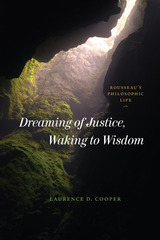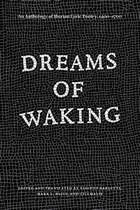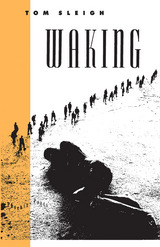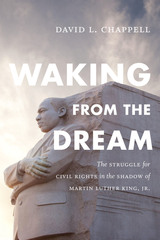4 books about Waking

Dreaming of Justice, Waking to Wisdom
Rousseau's Philosophic Life
Laurence D. Cooper
University of Chicago Press, 2023
A surprising look at how Rousseau defended the philosophic life as the most natural and best of lives.
Dreaming of Justice, Waking to Wisdom reveals what could be thought of as the capstone of Rousseau’s thought, even if that capstone has been nearly invisible to readers. Despite criticizing philosophy for its corrosive effects on both natural goodness and civic virtue, Rousseau, argues Laurence D. Cooper, held the philosophic life as an ideal. Cooper expertly unpacks Rousseau’s vivid depiction of the philosophic life and the case for that life as the most natural, the freest, or, in short, the best or most choice-worthy of lives. Cooper focuses especially on a single feature, arguably the defining feature of the philosophic life: the overcoming of the ordinary moral consciousness in favor of the cognitivist view of morality. Cooper shows that Rousseau, with his particular understanding and embrace of the philosophic life, proves to be a kind of latter-day Socratic. Thorough and thought-provoking, Dreaming of Justice, Waking to Wisdom provides vital insight into Rousseau.
Dreaming of Justice, Waking to Wisdom reveals what could be thought of as the capstone of Rousseau’s thought, even if that capstone has been nearly invisible to readers. Despite criticizing philosophy for its corrosive effects on both natural goodness and civic virtue, Rousseau, argues Laurence D. Cooper, held the philosophic life as an ideal. Cooper expertly unpacks Rousseau’s vivid depiction of the philosophic life and the case for that life as the most natural, the freest, or, in short, the best or most choice-worthy of lives. Cooper focuses especially on a single feature, arguably the defining feature of the philosophic life: the overcoming of the ordinary moral consciousness in favor of the cognitivist view of morality. Cooper shows that Rousseau, with his particular understanding and embrace of the philosophic life, proves to be a kind of latter-day Socratic. Thorough and thought-provoking, Dreaming of Justice, Waking to Wisdom provides vital insight into Rousseau.
[more]

Dreams of Waking
An Anthology of Iberian Lyric Poetry, 1400-1700
Edited and Translated by Vincent Barletta, Mark L. Bajus, and Cici Malik
University of Chicago Press, 2013
In this anthology, Vincent Barletta, Mark L. Bajus, and Cici Malik treat the Iberian lyric in the late Middle Ages and early modernity as a deeply multilingual, transnational genre that needs to break away from the old essentialist ideas about language, geography, and identity in order to be understood properly. More and more, scholars and students are recognizing the limitations of single-language, nationalist, and period-bound canons and are looking for different ways to approach the study of literature. The Iberian Peninsula is an excellent site for this approach, where the history and politics of the region, along with its creative literature, need to be read and studied together with the way the works were composed by poets and eventually consumed by readers.
With a generous selection of more than one hundred poems from thirty-three poets, Dreams of Waking is unique in its coverage of the three main languages—Catalan, Portuguese, and Spanish—and lyrical styles employed by peninsular poets. It contains new translations of canonical poems but also translations of many poems that have never before been edited or translated. Brief headnotes provide essential details of the poets’ lives, and a general introduction by the volume editors shows how the poems and languages fruitfully intersect. With helpful annotations to the poetry, as well as a selected bibliography containing the most important editions and translations from all three of the main Iberian languages, this volume will be an indispensable tool for both specialists and students in comparative literature.
[more]

Waking
Tom Sleigh
University of Chicago Press, 1990
One of our most gifted poets, Sleigh reveals with vigor and delicacy the connections forged between the dead and the living. Waking is a moving narrative of the creation of the self.
". . . . it takes a book like Tom Sleigh's Waking to remind us of all that was most innately stirring and necessary about the confessional insurrection. . . . in Waking Sleigh proves himself worthy of spinning gold thread from the straw of sincerity, elevating his so-called confessions from the merely revealing to the durably revelatory."—David Barber, Poetry
"[Sleigh] is a consummate stylist whose formal control and exploitation of convention is graceful and calm. And yet it is from the calm and steady control that some of Sleigh's most emotionally powerful moments are acheived. . . .Waking is one of the strongest collections of poems to appear in the last few years."—Michael Collier, Partisan Review
"Tom Sleigh's second book of poems, Waking is so fine one can hardly do justice to it in a review. The second poem, 'Ending,' is a remarkable piece of work which introduces the notion of the 'hook'—which hooks us to life even while it kills us. It is a presence of painful mortality which haunts the rest of the book."—Liz Rosenberg, New York Times Book Review
"Waking handsomely and affirmatively demonstrates its own clean and demanding premise: one's imagination is awakened to life by the burden of mortality. One reads in these poems a view not of the poet's suffering, but of our own temporal joys and sorrows."—Jay Meek, Hungry Mind Review
"With the publication of Waking, his second collection of poems, Tom Sleigh establishes his voice among the strongest of his generation. A poet of subject and craft, his skill allows him to avoid the slackness of much free verse and, at the same time, break free of the stiff old numbers in order to create a spoken language of rhythmic intensity and eloquence. . . . In this book Tom Sleigh's vigilance provides his readers with an invaluable gift: we can wake our lives."—Stuart Dischell, Boston Review
". . . . it takes a book like Tom Sleigh's Waking to remind us of all that was most innately stirring and necessary about the confessional insurrection. . . . in Waking Sleigh proves himself worthy of spinning gold thread from the straw of sincerity, elevating his so-called confessions from the merely revealing to the durably revelatory."—David Barber, Poetry
"[Sleigh] is a consummate stylist whose formal control and exploitation of convention is graceful and calm. And yet it is from the calm and steady control that some of Sleigh's most emotionally powerful moments are acheived. . . .Waking is one of the strongest collections of poems to appear in the last few years."—Michael Collier, Partisan Review
"Tom Sleigh's second book of poems, Waking is so fine one can hardly do justice to it in a review. The second poem, 'Ending,' is a remarkable piece of work which introduces the notion of the 'hook'—which hooks us to life even while it kills us. It is a presence of painful mortality which haunts the rest of the book."—Liz Rosenberg, New York Times Book Review
"Waking handsomely and affirmatively demonstrates its own clean and demanding premise: one's imagination is awakened to life by the burden of mortality. One reads in these poems a view not of the poet's suffering, but of our own temporal joys and sorrows."—Jay Meek, Hungry Mind Review
"With the publication of Waking, his second collection of poems, Tom Sleigh establishes his voice among the strongest of his generation. A poet of subject and craft, his skill allows him to avoid the slackness of much free verse and, at the same time, break free of the stiff old numbers in order to create a spoken language of rhythmic intensity and eloquence. . . . In this book Tom Sleigh's vigilance provides his readers with an invaluable gift: we can wake our lives."—Stuart Dischell, Boston Review
[more]

Waking from the Dream
The Struggle for Civil Rights in the Shadow of Martin Luther King, Jr.
David L. Chappell
Duke University Press, 2016
In Waking from the Dream David L. Chappell—whose book A Stone of Hope the Atlantic Monthly called "one of the three or four most important books on the civil rights movement"— provides a sweeping history of the fight to keep the civil rights movement alive following Martin Luther King, Jr.’s assassination. Chappell reveals that, far from coming to an abrupt end with King's death, the civil rights movement continued to work to realize King's vision of an equal society. Entering a new phase where historic victories were no longer within reach, the movement's veterans struggled to rally around common goals; and despite moments where the movement seemed to be on the verge of dissolution, it kept building coalitions, lobbying for legislation, and mobilizing activists. Chappell chronicles five key events of the movement's post-King era: the passage of the Fair Housing Act in 1968; the debates over unity and leadership at the National Black Political Conventions; the campaign for full-employment legislation; the establishment of Martin Luther King, Jr. Day; and Jesse Jackson's quixotic presidential campaigns. With Waking from the Dream, Chappell provides a revealing look into a seldom-studied era of civil rights history, examines King's place in American memory, and explains how a movement labored to overcome the loss of its leader.
[more]
READERS
Browse our collection.
PUBLISHERS
See BiblioVault's publisher services.
STUDENT SERVICES
Files for college accessibility offices.
UChicago Accessibility Resources
home | accessibility | search | about | contact us
BiblioVault ® 2001 - 2024
The University of Chicago Press









